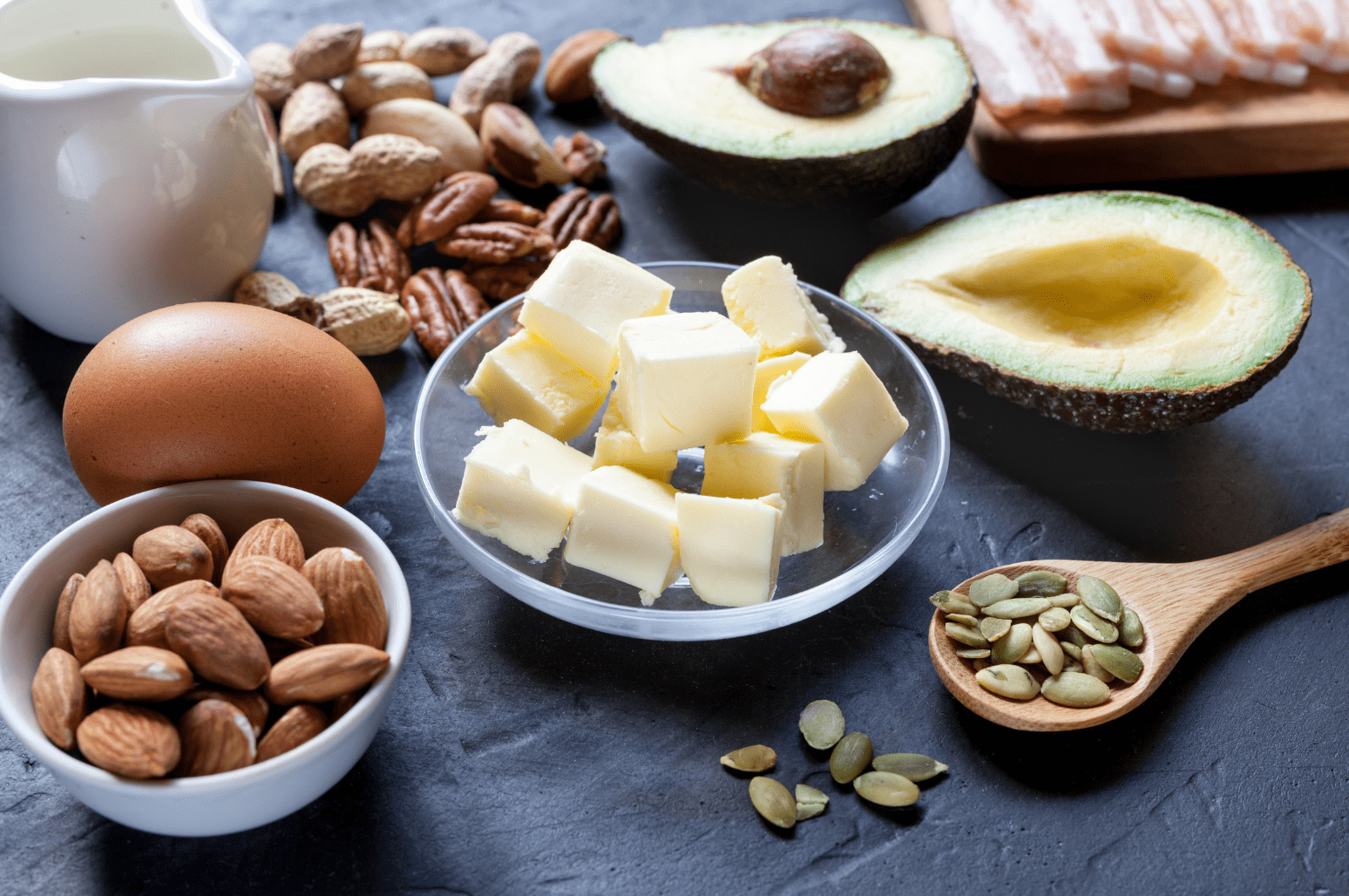Intermittent Fasting & Keto: What Breaks A Fast?

So, you’ve decided to try out intermittent fasting. You’ve done your research; you know all of the benefits, you’ve figured out the best fasting interval for you, and you’re ready to get started. If you’re keto, you probably know that intermittent fasting and keto go hand-in-hand and you’re ready to either enhance your results or break that pesky plateau you’ve been stuck in.
The time comes to start your fast and you realize you don’t know what you can and can’t have on a fast. So, you decide to Google what breaks a fast and stumble upon many different responses from a variety of people.
Some people say anything with calories breaks a fast while others say you can eat up to 50 calories. Does MCT oil break a fast? Does coffee break a fast? The answers are different everywhere you look, so how do you know what’s the truth? How do you know what really breaks a fast?
Well, the answer is, it depends on what you’re fasting for. Once you have determined your reason behind fasting, you can figure out what can prevent you from gaining these benefits.
You’re Fasting to Promote Autophagy
Autophagy is a natural process that occurs within your body and helps clean up and recycle dysfunctional or old cells. The word autophagy literally means self-eating. Research suggests that autophagy can help protect against:
- Aging/ age-related disease
- Cancer
- Neurodegenerative diseases
- Inflammatory diseases
- Infections
Research suggests that a lack of or reduced autophagy can lead to negative consequences such as:
- Obesity/weight gain
- Age-related muscle and bone mass loss
- Reduced cognitive functioning
Any foods or drinks other than water should be avoided to promote autophagy. Research suggests anything calories will reduce the activation of autophagy. Furthermore, some research suggests even zero-calorie drinks and foods like tea and coffee will also reduce autophagy. It is best to avoid everything besides water while fasting for autophagy.
“In humans, it appears that autophagy does not remain as active when any food is consumed.” – Benjamin Horne, Ph.D, genetic epidemiology
Quick Tip: If you are fasting to promote autophagy, stick to just consuming water during your fast.
You’re Fasting to Promote Growth Hormone Release
One of the most profound and least-discussed benefits of fasting is the increase in growth hormone (HGH). HGH is released by the pituitary gland and has several benefits including:
- Maintenance and repair of muscle and tissues
- Improvements in body composition (reduces body fat and builds muscle mass)
- Improved athletic performance
- Improved skin quality
HGH naturally decreases as we age and has been shown to have negative side effects such as:
- Sarcopenia (age-related muscle loss)
- Osteopenia (decreased bone mass)
If you are fasting to increase growth hormone levels, avoid consuming anything with calories. Somatostatin is a hormone that is produced in the digestive system and brain that is released after food consumption. It acts on the pituitary gland to inhibit growth hormone. Due to this, anything that can trigger a somatostatin release should be avoided, including foods with calories.
Caffeine has also been shown to reduce growth hormone release and should also be avoided (this includes coffee and green tea).
Quick Tip: If you are fasting to promote growth hormone release, stick to just consuming water during your fast!
You’re Fasting to Improve Body Composition
While HGH release can benefit body composition, fasting itself has other benefits for body composition simply because it reduces total caloric intake. If you are fasting to increase body fat loss while still preserving muscle mass, the most important factor is avoiding consuming too many calories. A splash of cream in your coffee should be fine as long as you keep it under 50 calories; however, if you find yourself plateauing, try reducing all intake to zero-calorie beverages.
Quick Tip: If you are fasting to improve body composition, stick to consuming under 50 calories during your fast.
You’re Fasting for General Health Reasons
The most important factor for improving general health is consistency, so find a fasting regimen you can stick to. Here are a few options you can try and figure out what works best for you:
- Try a Fat Fast: Both carbohydrates and protein trigger an insulin response, but only consuming fat while on a fast will increase ketone production and reduce insulin secretion. Try this out by adding MCT or coconut oil to your coffee!
- Trial and Error: Fasting provides numerous benefits you can feel (like increased mental clarity and focus). Try testing out different foods or drinks to determine which ones reduce this feeling for you. If you know drinking green tea with stevia reduces your focus, avoid it and stick to plain tea.
Quick Tip: If you are fasting for general health reasons, find a technique that works best for you. The most important factor is consistency so if adding a tbsp of coconut oil to your coffee in the morning allows you to stick to a fast, go for it!
Sneaky Ways You May Be Accidentally Breaking Your Fast
No matter why you are fasting, you still have to be cautious as to what you are consuming while fasting! You may be thinking that because something is labeled as zero calories you are in the clear, but it may actually break your fast and reduce all benefits!
Avoid having these while intermittent fasting:
- BCAAs (branched chain amino acids): Protein can trigger an insulin response and break your fast, not to mention most BCAA powders have flavoring that can also trigger an insulin response.
- Sweetener Packets: Many sweetener packets claim to be zero-calories, but in reality, most contain dextrose or maltodextrin. Both of these ingredients can trigger an insulin response and break your fast.
- Coffee: Going off of the last point on sweetener packets, if you are adding multiples of these in your coffee, you may be breaking your fast.
- Pre-workout: Most pre-workouts contain sweeteners for flavoring that can trigger an insulin response. Additionally, if your pre-workout contains BCAAs, this can definitely break your fast.
- Multi-vitamins: Do you take a gummy or chewable multi-vitamin? If so, it is flavored to make consumption more palatable, but this will cause an insulin response and break your fast.
References
Autophagy
Alirezaei, M., et al. Short-term fasting induces profound neuronal autophagy. Autophagy. 2010, (6):702-210.
Bagherniya, M., Butler, A., Barreto, G., & Sahebkar, A. The effect of fasting or calorie restriction on autophagy induction: A review of the literature. Ageing Research. 2018, (47): 183-197.
Godar, R., et al. Repetitive stimulation of autophagy-lysosome machinery by intermittent fasting preconditions the myocardium to ischemia-reperfusion injury. Autophagy. 2014, (9):1537-1560.
Liu, H., et al. Intermittent fasting preserves beta-cell mass in obesity-induced diabetes via the autophagy-lysosome pathway. Autophagy. 2017, (11): 1952-1968.
Martinez-Lopez, N., et al. System-wide Benefits of Intermeal Fasting by Autophagy. Cell Metabolism. 2017, (6): 856-871.
Masiero, E., et al. Autophagy Is Requires to Maintain Muscle Mass. Cell Metabolism. 2009, (6): 507-515.
Growth Hormone
Cahill, G., et al. Hormone-fuel Interrelationships during fasting. Journal of Clinical Investigations. 1966, (45).
Ho, K., Veldhuis, J., Johnson, M., Furlanetto, W., Alberti, K., & Thorner, M. Fasting enhances growth hormone secretion and amplifies the complex rhythms of growth hormone secretion in man. Journal of Clinical Investigations. 1988, (4):968-975.
Palmblad, J., Levi, L., Burger, A., Melander, A., Westgren, U., von Schenck, H., & Skude, G. Effects of Total Energy Withdrawl (Fasting) on the Levels of Growth Hormone, Thyrotropin, Cortisol, Adrenaline, Noradrenaline, T4, T3, rT3 in Healthy Males. Journal of Internal Medicine. 1977, (201):1-6.
Roth, J., Glick, S., Yalow, S., & Berson, S. Hypoglycemia: A Potential Stimulus to Secretion of Growth Hormone. Science. 1963, (140): 987-988.
Thorner, M., et al. Physiological role of somatostatin on growth hormone regulation in humans. Metabolism. 1990, (39): 40-42.
Unger, R., Eisentraut, A., Madison, L., & Siperstein, M. Fasting Levels of Growth Hormone in Men and Women. Nature. 1965, (205): 804-805.
Body Composition
Klempel MC, Kroeger CM, Bhutani S, Trepanowski JF, Varady KA. Intermittent fasting combined with calorie restriction is effective for weight loss and cardio-protection in obese women. Nutr J. 2012;11:98. Published 2012 Nov 21.
Memari AH, Kordi R, Panahi N, Nikookar LR, Abdollahi M, Akbarnejad A. Effect of Ramadan fasting on body composition and physical performance in female athletes. Asian J Sports Med. 2011;2(3):161–166.
Norouzy, A., et al. Effect of fasting Ramadan on body composition and nutritional intake: a prospective study. Journal of Human Nutrition and Dietetics. 2013, (26).
Tinsley, G., & La Bountry, P. Effects of intermittent fasting on body composition and clinical health markers in humans. Nutrition Review. 2015, (73): 661-674.
General Health
Azevedo, F., Ikeoka, D.,& Caramelli, B. Effects of intermittent fasting on metabolism in men. Rev Assoc Med Bras. 1992, (2):167-73.
Mattson, Mp. Lifelong brain health is a lifelong challenge: From evolutionary principles to empirical evidence. 2015. (20): 37-45.
Mattson MP, Longo VD, Harvie M. Impact of intermittent fasting on health and disease processes. Ageing Res Rev. 2017;39:46–58.
Ravussin, E., Gilmore, L., & Redman, L. Calorie Restriction in Humans: Impact on Human Health. Molecular Basis of Nutrition and Aging. 2016, 677-692.
Sarraf-Zadegan, et al. The effects of fasting in Ramadan on the values and interrelations between biochemical, coagulation, and hematological factors. Annals of Saudi Medicine. 2000. (20)5-6.










